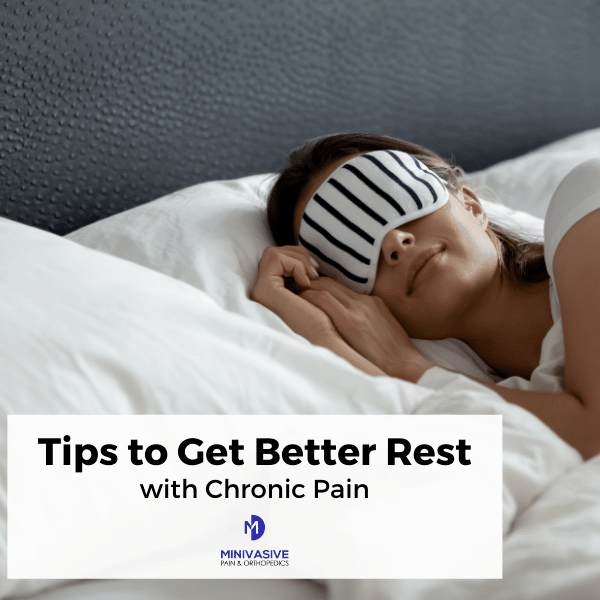Sleeping disturbances, and its chronic condition, insomnia, often go hand-in-hand with chronic pain. It’s a catch 22; pain can disrupt a good night’s rest, but lack of sleep can worsen your pain. If you have trouble falling asleep, staying asleep all night, waking early in the morning or feeling exhausted after getting a full night’s sleep, check out these tips that may help you regulate your sleep schedule. Of course, if your symptoms are severe, it’s best to consult your physician for a treatment plan that works best for you.
Practice Yoga Regularly
Yoga is a non-intense form of exercise that promotes mind and body health. Through yoga’s physical poses, guided breathing and meditation, your chronic back pain may improve, helping your sleeping habits improve as well.
We recommend learning yoga from a licensed instructor who can tailor the poses to your physical tolerance and capability. Once you learn how to properly move through each pose, you can then begin practicing at home when convenient. As always, if you experience pain during exercise, stop what’s hurting immediately and inform your doctor and instructor.
Eat Foods That Promote Sleep
Adding foods rich in tryptophan to your evening meal time can help promote better sleeping. Tryptophan is a protein that is vital in producing the sleep hormone serotonin. It can help you fall asleep more quickly, sleep more restfully, and improve alertness when you awake in the morning. These foods include:
- Fruit such as cherries or kiwis
- Carbs with a high glycemic index, such as rice
- Whole foods like fish, milk, and shellfish
Regulate Your Breathing
When you are struggling with sleeping, it can seem like nothing will help. However, practicing slow, rhythmic breathing can help to alleviate pain and reduce the time it takes for you to fall asleep. You can do this when first going to bed at night, or if you wake up during the middle of the night and can’t fall back to sleep.
Slow, deep breaths can also synchronize your breathing with your heartbeat, promoting more restorative sleep.
Take Short Evening Walks
If you work in an office, struggle with chronic back pain, and/or get minimal exercise, adding in a short walk each night can help improve your sleeping. During your walk, your body temperature increases, then begins to drop due to the heat dissipation mechanisms of the body (such as increased blood flow). Your resulting lower body temperature then triggers your sleep cycle. Additional benefits of walking include reduced anxiety, which can also help you get better sleep.
Get Help from a Sleep Aid
There are a variety of sleeping aids on the market that can help you fall asleep more quickly and stay asleep longer. These include:
- Herbal: Camomile Tea or Valerian Capsules
- Fruit Extract: Cherry Juice or Capsules
- Micronutrients: Zinc or Magnesium Supplements
- Melatonin capsules or tablets
These aids may help improve the onset, duration, and quality of your sleep, though every individual responds differently. Click here to learn more about sleep aids.
If you’re experiencing insomnia or sleeping disturbances because of your chronic pain, it may be worth trying one or more of these strategies to improve your sleep schedule. If you try the tips and are still struggling with sleep and pain, reach out to a medical professional for further help.
Chronic Pain Houston: Minivasive Pain and Orthopedics
At Minivasive Pain, we have a dedicated staff of pain management specialists. No matter the cause of your chronic pain, it is our mission to treat the causes with both the highest standards of care and quality. With several pain management centers throughout the Houston area, caring for your pain is what we do every day. To learn more, or to schedule an appointment, visit https://minivasivepain.com/contact-us/ or call us at (346) 800-6001.

